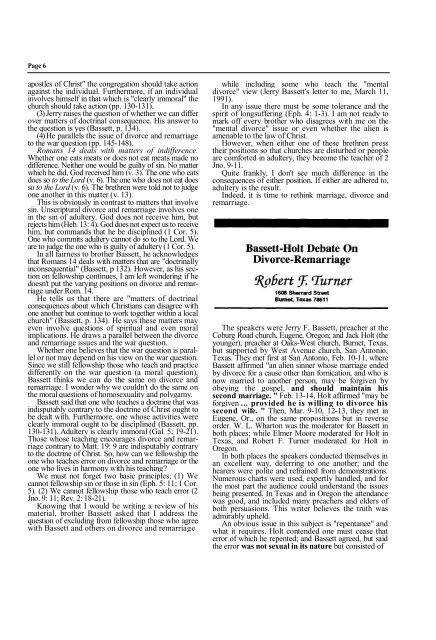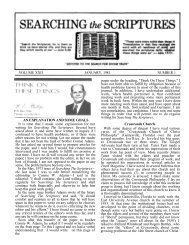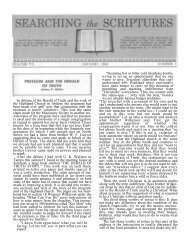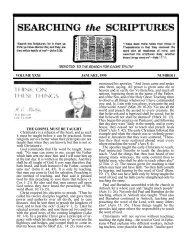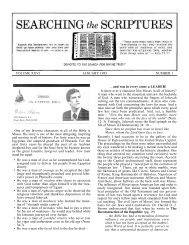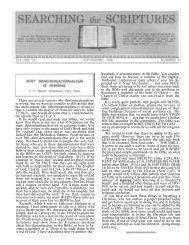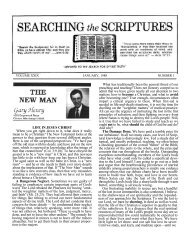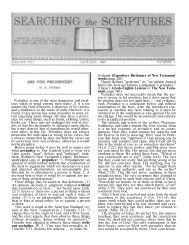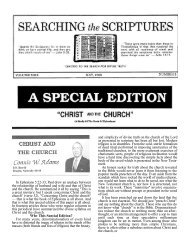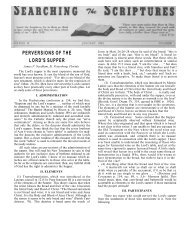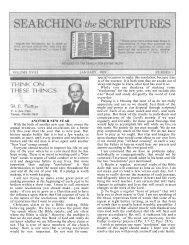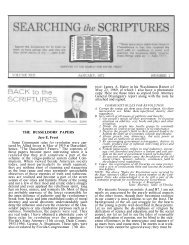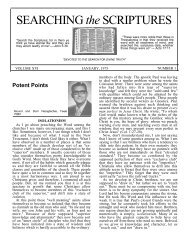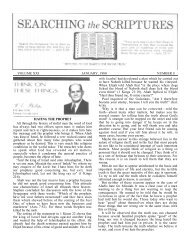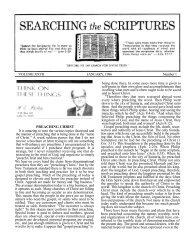How Do Men Forsake The Right Way? - Searching The Scriptures
How Do Men Forsake The Right Way? - Searching The Scriptures
How Do Men Forsake The Right Way? - Searching The Scriptures
You also want an ePaper? Increase the reach of your titles
YUMPU automatically turns print PDFs into web optimized ePapers that Google loves.
Page 6<br />
apostles of Christ" the congregation should take action<br />
against the individual. Furthermore, if an individual<br />
involves himself in that which is "clearly immoral" the<br />
church should take action (pp. 130-131).<br />
(3) Jerry raises the question of whether we can differ<br />
over matters of doctrinal consequence. His answer to<br />
the question is yes (Bassett, p. 134).<br />
(4) He parallels the issue of divorce and remarriage<br />
to the war question (pp. 145-148).<br />
Romans 14 deals with matters of indifference.<br />
Whether one eats meats or does not eat meats made no<br />
difference. Neither one would be guilty of sin. No matter<br />
which he did, God received him (v. 3). <strong>The</strong> one who eats<br />
does so to the Lord (v. 6). <strong>The</strong> one who does not eat does<br />
so to the Lord (v. 6). <strong>The</strong> brethren were told not to judge<br />
one another in this matter (v. 13).<br />
This is obviously in contrast to matters that involve<br />
sin. Unscriptural divorce and remarriage involves one<br />
in the sin of adultery. God does not receive him, but<br />
rejects him (Heb. 13: 4). God does not expect us to receive<br />
him, but commands that he be disciplined (1 Cor. 5).<br />
One who commits adultery cannot do so to the Lord. We<br />
are to judge the one who is guilty of adultery (1 Cor. 5).<br />
In all fairness to brother Bassett, he acknowledges<br />
that Romans 14 deals with matters that are "doctrinally<br />
inconsequential" (Bassett, p 132). <strong>How</strong>ever, as his section<br />
on fellowship continues, I am left wondering if he<br />
doesn't put the varying positions on divorce and remarriage<br />
under Rom. 14.<br />
He tells us that there are "matters of doctrinal<br />
consequences about which Christians can disagree with<br />
one another but continue to work together within a local<br />
church" (Bassett, p. 134). He says these matters may<br />
even involve questions of spiritual and even moral<br />
implications. He draws a parallel between the divorce<br />
and remarriage issues and the war question.<br />
Whether one believes that the war question is parallel<br />
or not may depend on his view on the war question.<br />
Since we still fellowship those who teach and practice<br />
differently on the war question (a moral question),<br />
Bassett thinks we can do the same on divorce and<br />
remarriage. I wonder why we couldn't do the same on<br />
the moral questions of homosexuality and polygamy.<br />
Bassett said that one who teaches a doctrine that was<br />
indisputably contrary to the doctrine of Christ ought to<br />
be dealt with. Furthermore, one whose activities were<br />
clearly immoral ought to be disciplined (Bassett, pp.<br />
130-131). Adultery is clearly immoral (Gal. 5; 19-21).<br />
Those whose teaching encourages divorce and remarriage<br />
contrary to Matt. 19: 9 are indisputably contrary<br />
to the doctrine of Christ. So, how can we fellowship the<br />
one who teaches error on divorce and remarriage or the<br />
one who lives in harmony with his teaching?<br />
We must not forget two basic principles; (1) We<br />
cannot fellowship sin or those in sin (Eph. 5: 11; 1 Cor.<br />
5). (2) We cannot fellowship those who teach error (2<br />
Jno. 9: 11; Rev. 2: 18-21).<br />
Knowing that I would be writing a review of his<br />
material, brother Bassett asked that I address the<br />
question of excluding from fellowship those who agree<br />
with Bassett and others on divorce and remarriage<br />
while including some who teach the "mental<br />
divorce" view (Jerry Bassett's letter to me, March 11,<br />
1991).<br />
In any issue there must be some tolerance and the<br />
spirit of longsuffering (Eph. 4: 1-3). I am not ready to<br />
mark off every brother who disagrees with me on the<br />
"mental divorce" issue or even whether the alien is<br />
amenable to the law of Christ.<br />
<strong>How</strong>ever, when either one of these brethren press<br />
their positions so that churches are disturbed or people<br />
are comforted in adultery, they become the teacher of 2<br />
Jno. 9-11.<br />
Quite frankly, I don't see much difference in the<br />
consequences of either position. If either are adhered to,<br />
adultery is the result.<br />
Indeed, it is time to rethink marriage, divorce and<br />
remarriage.<br />
<strong>The</strong> speakers were Jerry F. Bassett, preacher at the<br />
Coburg Road church, Eugene, Oregon; and Jack Holt (the<br />
younger), preacher at Oaks-West church, Burnet, Texas,<br />
but supported by West Avenue church, San Antonio,<br />
Texas. <strong>The</strong>y met first at San Antonio, Feb. 10-11, where<br />
Bassett affirmed "an alien sinner whose marriage ended<br />
by divorce for a cause other than fornication, and who is<br />
now married to another person, may be forgiven by<br />
obeying the gospel, and should maintain his<br />
second marriage. " Feb. 13-14, Holt affirmed "may be<br />
forgiven ... provided he is willing to divorce his<br />
second wife. " <strong>The</strong>n, Mar. 9-10, 12-13, they met in<br />
Eugene, Or., on the same propositions but in reverse<br />
order. W. L. Wharton was the moderator for Bassett in<br />
both places; while Elmer Moore moderated for Holt in<br />
Texas, and Robert F. Turner moderated for Holt in<br />
Oregon.<br />
In both places the speakers conducted themselves in<br />
an excellent way, deferring to one another; and the<br />
hearers were polite and refrained from demonstrations.<br />
Numerous charts were used, expertly handled, and for<br />
the most part the audience could understand the issues<br />
being presented. In Texas and in Oregon the attendance<br />
was good, and included many preachers and elders of<br />
both persuasions. This writer believes the truth was<br />
admirably upheld.<br />
An obvious issue in this subject is "repentance" and<br />
what it requires. Holt contended one must cease that<br />
error of which he repented; and Bassett agreed, but said<br />
the error was not sexual in its nature but consisted of


